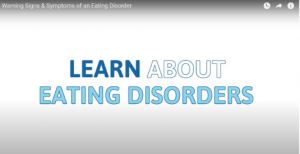By Susan Merkel, MSW, LSW

We are now a year into COVID-based closures and social distancing that keep us stuck at home and out of gyms, and many of us have gained some weight.
We may wear sweatpants or yoga pants on the bottom and a nice shirt on the top during virtual meetings and not worry about how we look since many are not going out much. We may laugh about our weight, start online workouts, or walk with friends. It may bother us, so we diet and move on.
For some, their weight is not a simple issue.
Having a healthy body image is an essential piece of mental wellbeing. We start to internalize messages about how we view ourselves compared to others at a young age. We look at our height, body shape, and weight around age eight. We feel a sense of control of how our bodies move or how we physiologically experience or feel in our bodies.
Individuals who struggle with eating disorders have a distorted experience of their body shape, height, and weight.
Eating disorders are a serious but treatable mental illness. In some cases, disordered eating can control a person’s life. They may skip meals, exhibit ritualist behaviors related to food, overeat or purge, or lose weight quickly. These behaviors have long-term consequences to their heart, teeth, endocrine system. Kidney problems can develop from chronic dehydration, brittle nails from food restrictions, and other organs, so early diagnosis is essential.
Eating disorders and bullying
In fact, researchers have found that illnesses such as anorexia and bulimia increased during the last 20 years. US-based studies show that 5% of US females and .5% of US males between ages 14 and 30 are most at risk. These dangerous disorders correlate to poor body image, bullying, low self-esteem, anxiety, depression, and post-traumatic stress disorders.

Many people assume that males do not experience disordered eating. Yet, they represent 25% of individuals with anorexia nervosa. Sports that focus on weight, including gymnastics, equine sports, swimming, or wrestling, pressure male athletes to binge or purge. Because people assume males don’t have eating disorders, they may not be properly diagnosed and are at higher risk
Furthermore, disordered eating and body image directly link to bullying. The research focused on elementary students reveals that 40% of overweight girls and 37% of overweight boys are teased about their weight by peers or family members. Moreover, nearly 70% of elementary girls base the ideal body on models they see in magazines. The result, Bulimia Nervosa, occurs in 4.5% of adolescent females.
Signs your child may have an eating disorder
- Any new practices with food or fad diets, including cutting out entire food groups (no sugar, no carbs, no dairy, vegetarianism/veganism)
- Abnormal laboratory findings (anemia, low thyroid and hormone levels, low potassium, low white and red blood cell counts)
- Dental problems, such as enamel erosion, cavities, and tooth sensitivity, or discoloration of teeth from vomiting
- Cold, mottled hands and feet or swelling of feet
- Cuts and calluses across the top of finger joints (a result of inducing vomiting)
- Dry skin and hair and brittle nails
- Difficulties concentrating
- Discomfort eating around others
- Dizziness, primarily upon standing
- Extreme concern with body size and shape
- Extreme mood swings
- Fainting/syncope
- Feeling cold all the time
- Fine hair on the body (lanugo)
- Food rituals (e.g., eating only a particular food or food group, excessive chewing)
- Frequent checking in the mirror for perceived flaws in appearance
- Impaired immune functioning
- Menstrual irregularities
- Muscle weakness
- Noticeable fluctuations in weight, both up and down
- Poor wound healing
- Stomach cramps, other non-specific gastrointestinal complaints (constipation, acid reflux, etc.)
- Sleep problems
- Swelling around the area of salivary glands
- Withdrawal from usual friends and activities
More warning signs of eating disorders

Click Below to learn more information
Reach Out to a Counselor
As always, if you find yourself struggling in these areas, do not hesitate to reach out for help. A licensed therapist or counselor can help empower you to be your best self! EWC has several therapists that are knowledgeable and specialize in eating disorders.
Susan Merkel is a licensed social worker. When she is not working or advocating, Susan loves spending time with her family, dog, and cat. Susan loves reading, kayaking, horseback riding, hiking, the beach, and movies. Susan’s passion is working with members of the adoption constellation, including adoptive parents, adoptees, birthparents, pre-adoptive parents.EWC has locations in Manalapan and Shrewsbury, NJ, and accepts a variety of insurances.
Check out Susan’s professional bio here!
Email Us: info@exceptionalwellnesscounseling.com
Call Now: (908) 415-2042
NEXT STEPS & RESOURCES
- Are you ready to take your first step? Reach out to us.
- Do you feel you may benefit from counseling during this time? Take the first step.
- Interested in online counseling? Learn more.
- Resources for understanding white privilege and anti-racism:
